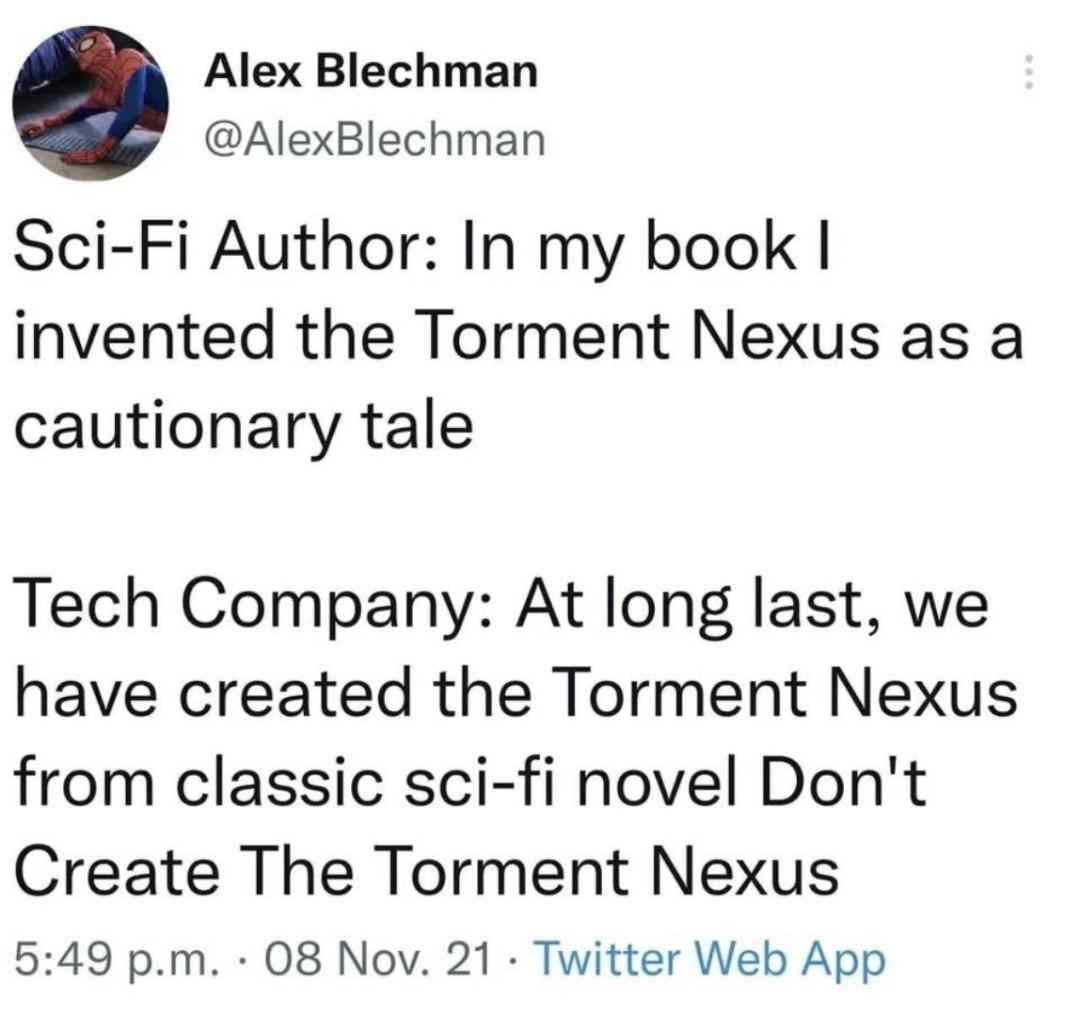this post was submitted on 22 Aug 2023
122 points (99.2% liked)
Programmer Humor
19572 readers
1645 users here now
Welcome to Programmer Humor!
This is a place where you can post jokes, memes, humor, etc. related to programming!
For sharing awful code theres also Programming Horror.
Rules
- Keep content in english
- No advertisements
- Posts must be related to programming or programmer topics
founded 1 year ago
MODERATORS
you are viewing a single comment's thread
view the rest of the comments
view the rest of the comments

This is superficially funny, of course. But I've seen it before and after thinking about it for a while I find myself coming to the defense of the Torment Nexus and the tech company that brought it into reality.
Science fiction authors are not necessarily the best authorities when it comes to evaluating the ethical or real-world implications of the technologies they dream up. Indeed, I think they are often particularly bad at that sort of thing. Their primary goal is to craft captivating narratives that engage readers by introducing conflicts and dilemmas that make for compelling stories. When they imagine a new technology they aren't going to get paid unless they come up with a story in which that new technology poses some kind of threat that the heroes need to overcome. The dark side of these technologies is deliberately emphasized by the authors to create tension and drama in their stories.
Tech companies, on the other hand, have an entirely different set of considerations. Their goal isn't just to recreate something from a sci-fi novel for the sake of it; rather, they are motivated by solving real-world problems. They wouldn't build the Torment Nexus unless they figured that they could sell it to someone, and that they wouldn't get shut down for doing something society would reject. There are regulatory frameworks around this kind of thing.
If you look back through older science fiction you can find all sorts of "cautionary tales" against technologies that have turned out to be just fine. "Fahrenheit 451" warned against the proliferation of television entertainment, but there's been plenty of rich culture developed for that medium. "Brave New World" warned against genetic engineering, but that's turned out to be a great technology for curing diseases and improving crop yields. The submarine in "20,000 Leagues Under the Sea" was seen as unstoppable and disruptive, but nowadays submersibles have plenty of nonmilitary applications.
I'd want to know more about what exactly the Torment Nexus is before I automatically assume it's a bad idea just because some sci-fi writer claimed it was.
Television and increasingly digestible media is turning our brains to mush. If someone had the imagination to write a sci-fi novel about Fox news and the rise of Trump, they would have.
Genetic engineering is enabling us to harvest monocultures that completely fuck up the ecosystem, in the long run not only underlining important dynamics such as species needed for polluting plants, but also the very soil on which they grow.
It's been a while since I read Brave New World, but that also didn't stand out to me as the most central part of his critique to me. In my reading it was about how modern society was going to turn us into essentially pacified consumer slaves going from one artificial hormonal kick to the other, which seems to be what social media is for these days.
Things that seem like short term good ideas, and certainly great business ideas, might fuck things up big time in the long run. That's why it's useful to have some people doing the one things humans are good at - thinking creatively - involved in processes of change, and not just leave it to the short term interests of capital.
No it isn't. Global connectivity is just putting a spotlight on the the fact that most people are and always have been fucking stupid and/or dangerously undereducated.
I mean, it's a challenging hypothesis to prove. I might just be pessimistic.
I think there is some reason for valid concern though. The New York Times memoriam for Clifford Nass is an interesting and somewhat worrying read.
Maybe more practically, it's just hard to argue America wouldn't be in a better place right now if it wasn't for Fox News and Facebook/Cambridge Analytica.